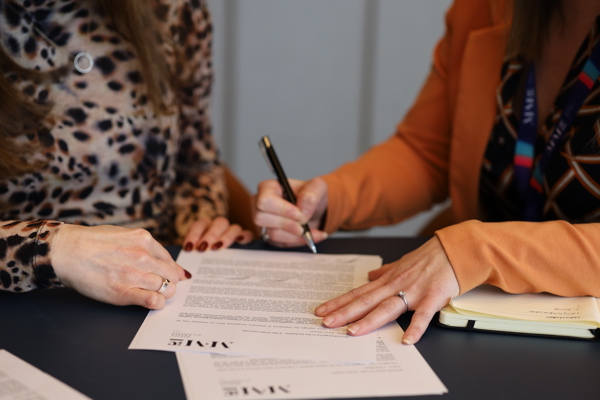Imagine you are asked to write a brief note of you and your spouses' net worth. Most of us would like to think we would be quick to provide a relatively full and up-to-date list, possibly logging onto our online banking account to check the balances of any joint accounts. Maybe we would do some speedy arithmetic to work out how much our house is worth once any mortgage has been taken off, with the assistance of an online property portal such as Zoopla or Rightmove to gauge the value. Perhaps you would hazard a guess at the value of any cars or valuable items such as jewellery and have a hunt around for your last premium bond or ISA statement.
One asset that may not immediately spring to mind is the value of any pensions. Research from Standard Life has shown that 75% of UK adults don't know how much is in their own pension pot, let alone their spouses. This rises to a staggering 79% for women.
Now, imagine you are in the middle of a divorce process. As part of this, parties are expected to share a full list of their assets and debts to agree a fair settlement. A solicitor or family mediator may be involved at some stage of this discussion, whether to advise clients on what a fair settlement looks like during negotiation, provide information, or guide their client through the court process should agreement not be reached. However, it remains open to couples to deal with their own divorce should they consider matters to be relatively straightforward and uncontentious. While this can be a cheaper way of doing things, it may well mean you risk losing out on a fair settlement.
Pension assets can often be overlooked in divorce proceedings. When discussing a financial settlement upon divorce, it is understandably more "visible" assets such as a family home or investment properties that parties are quick to consider. Highly liquid assets like money held in bank accounts are also difficult to ignore. It is logical to consider assets you can live in or readily liquidate as a priority to secure. Pensions, on the other hand, can be highly complex and this can often deter parties from considering them properly. This is particularly true if your spouse dealt with most of the financial administration during your marriage. I regularly come across clients who have a very limited understanding of their spouse's pension assets. This limited understanding can prevent an open conversation around pension wealth being had if parties are not instructed experts who could facilitate. In some cases, Pensions may well be the most valuable assets in the matrimonial pot.
As part of my practice as a family lawyer and mediator, I regularly advise clients on their entitlement to their spouse's pension pot. These clients can often be women who have comparatively less (or indeed nothing at all) in their own pot, who have taken time out of paid employment to contribute to the marriage through unpaid care of children and the home. They may have later returned to work on a part-time basis or missed out on career progression during their time out of the workforce. Therefore, their pots will not have had the same growth opportunity. While their spouses, on the other hand, will have had the benefit of support at home that allowed him to continue to work and accumulate their pension pot. Once you add on compounding interest and part-time workers earning less than £10,000 (the majority of whom are women) not being auto enrolled in pension schemes, there is no surprise that stark gender inequality within pension wealth exists.
It is well documented that the Gender Pay gap extends to pensions, and women in particular should be mindful that the law provides for entitlement to your husband's private pension. Married men are the group in society who hold the most pension wealth and divorced women risk foregoing a long-term income into retirement if adequate provision is not met. The numbers of women who are expected to retire without pension income to meet their basic needs jump dramatically to 60% upon divorce. (Women & Retirement Report 2023 (scottishwidows.co.uk)). It is unacceptable that divorce has essentially become a risk factor for pension provision in women, despite the law offering a chance to mitigate this. The courts in England and Wales consider the total value of pensions each spouse has built up. A fair share of private pension can be achieved by the court in a number of ways:
- Sharing the pension by transferring a share of the benefits of the pension into the name of the otherwise entitled spouse
- Offsetting the pension with careful calculation made in reference to other assets
- Earmarking the pension, which transfers entitlement to the some or all of the income and lump sum benefit to the otherwise unentitled spouse
Despite this legal framework, research from Scottish Widows shows that the majority of women (60%) did not discuss pension assets at all during their divorce.
This has been compounded by the potential and unintended consequence of the streamlining of the divorce process in England and Wales through the introduction of true "no fault" divorce in 2022. This was rightly being heralded as a step in the right direction for progress in family law. However, research shows that those couples who mention fault in their application for divorce are more likely to instruct a lawyer and take a more formal route in financial negotiations. Pensions are the assets which seem to be overlooked or shared inequitably most commonly in 'DIY' divorces. It remains to be seen whether the focus couples "moving on" risks pensions not being properly taken into account. It can sometimes take a number of weeks or months to secure an accurate valuation from Pension Administrators. Then a considerable amount of time for an Actuary (professional expert who calculates what pensions are worth and how they should be divided). It is precisely these additional burdens which mean pensions can be forgotten in a more simplified process.
If you are concerned about your entitlement to your spouse's pensions, or that due attention has been paid to pension assets, you should seek assistance quickly and certainly before the final order in divorce itself has been granted. There is a huge danger in the event that a divorce has been finalised before a pension order is in place. It could result in loss of benefits or and any entitlement to your spouse's pensions post-divorce.


